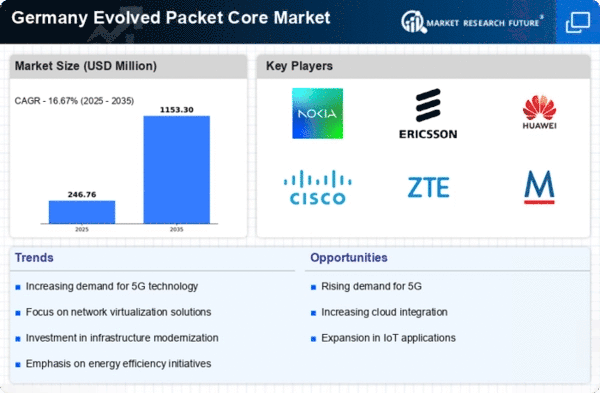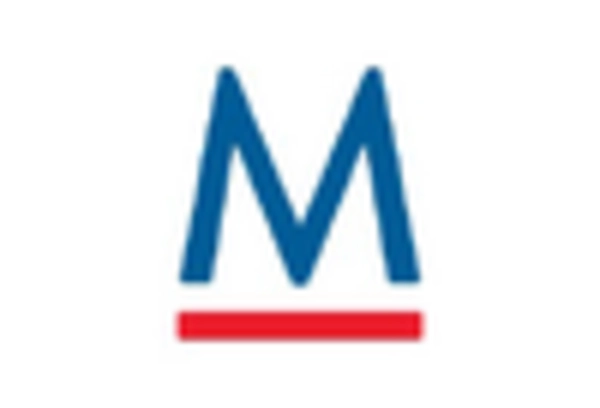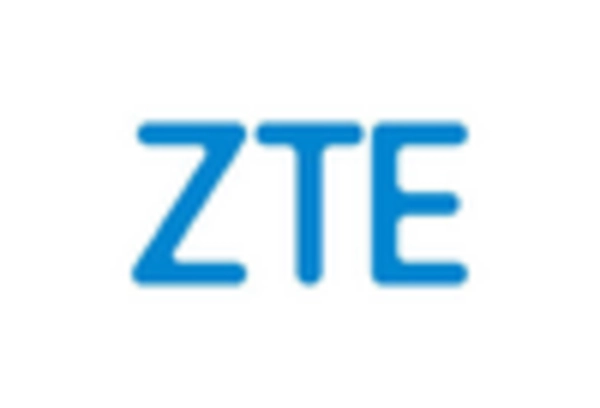Growing Demand for 5G Connectivity
The increasing demand for 5G connectivity in Germany is a primary driver for the virtualized evolved-packet-core market. As telecommunications providers strive to enhance their network capabilities, the need for a robust and flexible core network becomes evident. The virtualized evolved-packet-core market is projected to grow at a CAGR of approximately 25% from 2025 to 2030, driven by the rollout of 5G networks. This technology enables faster data transmission and lower latency, which are essential for supporting a wide range of applications, including IoT and smart city initiatives. Consequently, telecommunications companies are investing heavily in virtualized solutions to meet the evolving demands of consumers and businesses alike.
Cost Efficiency and Operational Flexibility
Cost efficiency remains a crucial driver for the virtualized evolved-packet-core market in Germany. Telecommunications operators are increasingly seeking ways to reduce operational costs while maintaining high service quality. Virtualized solutions offer significant advantages in terms of resource utilization and scalability, allowing operators to optimize their network operations. By transitioning to a virtualized architecture, companies can potentially reduce their capital expenditures by up to 30%, as they can leverage existing hardware and minimize the need for proprietary equipment. This shift not only enhances operational flexibility but also enables faster deployment of new services, thereby driving growth in the virtualized evolved-packet-core market.
Increased Investment in Network Modernization
The ongoing trend of network modernization in Germany serves as a significant driver for the virtualized evolved-packet-core market. Telecommunications operators are recognizing the necessity of upgrading their legacy systems to meet the demands of modern applications and services. Investments in virtualized core networks are expected to reach €2 billion by 2026, as operators seek to enhance their service offerings and improve network performance. This modernization effort not only facilitates the integration of new technologies but also supports the deployment of advanced services such as edge computing and IoT. Consequently, the virtualized evolved-packet-core market is poised for substantial growth as operators prioritize modernization initiatives.
Regulatory Support for Digital Transformation
In Germany, regulatory frameworks are increasingly supportive of digital transformation initiatives, which significantly impacts the virtualized evolved-packet-core market. The German government has implemented policies aimed at fostering innovation in telecommunications, including funding for research and development in network technologies. This regulatory environment encourages operators to adopt virtualized solutions, as they align with national objectives for enhancing digital infrastructure. The market is expected to benefit from these initiatives, with an estimated increase in investment in virtualized technologies reaching €1 billion by 2027. Such support not only accelerates the deployment of advanced network solutions but also enhances the overall competitiveness of the telecommunications sector.
Rising Importance of Data Privacy and Security
As data privacy and security concerns continue to escalate, the virtualized evolved-packet-core market is witnessing a heightened focus on secure network solutions in Germany. With the implementation of stringent data protection regulations, such as the GDPR, telecommunications providers are compelled to adopt advanced security measures within their network architectures. Virtualized solutions can integrate robust security features, enabling operators to safeguard sensitive data while ensuring compliance with regulatory requirements. This trend is likely to drive market growth, as companies invest in secure virtualized core networks to protect against cyber threats and maintain customer trust.
















